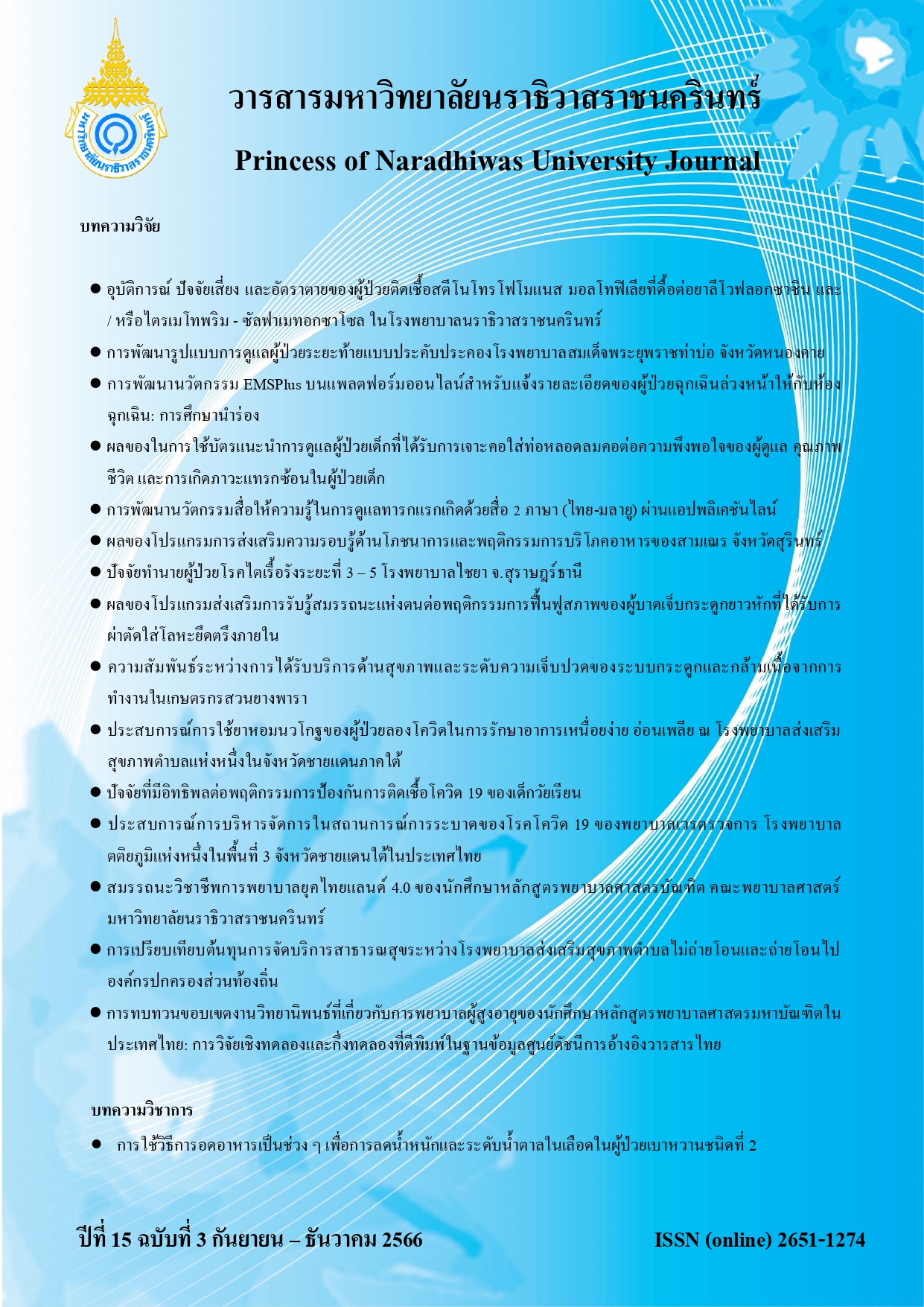Management Experiences During the COVID-19 Pandemic Situation of Nurse Supervisors at the Tertiary Hospital in Three Provinces of the Southern Border Area, Thailand
Keywords:
Nurse supervisors, Crisis management, Descriptive phenomenology research, COVID - 19Abstract
The purpose of this descriptive phenomenology research was to study the management experiences and meaning given to these experiences of nurse supervisors at a tertiary hospital in the three provinces of the southern border area during the COVID-19 pandemic. The informants were 26 registered nurses who worked in a tertiary hospital in a province of this area and performed the nurse supervisor role during this situation. Data were collected by two focus group discussions and 21 in-depth interviews were conducted from April to June 2022 and Colaizzi's method was used for analysis. The research trustworthiness was approved following Lincoln and Guba’s concept.
The study findings were as follows. The nurse supervisors provided meaning regarding their management experiences of three themes: 1) working with a higher level of stress than usual, 2) solving immediate problems, and 3) learning from experiences and situations. The management experiences comprised six issues: 1) bed management for patient admission as much as possible, 2) nursing workforce management appropriately with the workload, 3) encouragement; to listen, solve and encourage nurse 4) management an infection prevention and control 5) dealing with conflicts from working, and 6) accurate and timely report of data and information related to the pandemic situation. This study provides the basic information for nursing administrators to plan a training program for nurses who are further in-charge nurse supervisors and prepare the operational plans when facing the crisis situation within the context of tertiary hospitals similar to those in three provinces of the southern area.
References
Akathin, S. (2021). Nurse Administrator Role for Emerging Infectious Diseases Nursing Service Management in hospital. Journal of The Royal Thai Army Nurses, 22(3), 46–52.
Cooper, C. L., & Marshall, J. (1976). Occupational sources of stress: A review of the literature relating to coronary heart disease and mental ill health. Journal of Occupational Psychology, 49(1), 11–28.
Chaiphibansarit, P. (2008). Quality of nursing administration. Bangkok: Chulalongkorn University. (in thai)
Department of Disease Control, Ministry of Public Health, Thailand. (2021). Coronavirus disease 2019. Retrieved November 22, 2022 from https:// ddc.moph.go.th/viral pneumonia.
Dewey, J. (1933). How We Think: A Restatement of the Relation of Reflective Thinking to the Educative Process. Boston, MA: D.C. Heath & Co Publishers.
Holge-Hazelton, B., Kjerholt, M., Rosted, E., Thestrup Hansen, S., Zacho Borre, L., & McCormack, B. (2021). Health professional frontline leaders’ experiences during the COVID-19 pandemic: a cross-sectional study. Journal of Healthcare Leadership, 15(18). 7-18.
Ibrahim, N., Ahmed, S., & Shereif, W. (2022). Critical care nurses’ conflict and communication gap during care of patients with corona virus: Port Said Scientific. Journal of Nursing, 9(2), 1-25.
Kukkong, K. & Eungpuang, A. (2014). A path of success in administration of feminine administrator under the office of secondary educational service area 25. Journal of Education Khon Kaen University (Graduate Studies Research), 8(3), 216–225.
Ministry of Public Health. (2021). Handbook of nursing management in the situation of the COVID-19 outbreak. Nonthaburi: Suetawan. (in thai)
Narathiwat Province. (2021). General information. Retrieved September 14, 2021 from http://www2. narathiwat.go.th/nara2016/content/general
Nursing Council. (2020). Guidelines for the control and prevention of Coronavirus 2019 (COVID-19) for nursing and midwifery professionals. Retrieved September 14, 2021 from https://www.tnmc.or.th/ images/userfiles/files/Covid-Update01042020.pdf.
Nursing Council. (2018). Announcement of the nursing council on the policy of the nursing council regarding manpower in the nursing team. Retrieved January 14, 2022 from https://www.tnmc.or.th/images/userfiles/files/003.pdf
Nursing Council. (2013). Competency of nursing administrators. Nonthaburi: Quality Thai Trading. (in thai)
Nursing Division. (2017). Guidelines for succession planning. Nursing professional line according to good governance principles. Nonthaburi: Ministry of Public Health. (in thai)
Pitsachart, N., Saenprasarn, P., & Yonchoho, N. (2021). Nursing administration in new normal Era. Journal of Nursing Division, 48(3), 202-211.
Poortaghi, S., Shahmari, M., & Ghobadi, A. (2021). Exploring nursing managers’ perceptions of nursing workforce management during the outbreak of COVID-19: a content analysis study. BMC nursing, 20, 1-10.
Rojanatrakul, T. (2019). Creative conflict management. The Academic Journal: Faculty of Humanities and Social Sciences Nakhonsawan Rajabhat University, 6(2), 69–83.
Sathira-Angkura, T., Leelawongs, S., Amonprompukdee, A., & Janta-Um-Mou, U. (2021). Driving the operation of the nurse collaboration center in COVID-19 outbreak. Journal of The Royal Thai Army Nurses, 22(1), 83-91.
Sofyana, H., Ibrahim, K., Afriandi, I., Herawati, E., & Nugroho, H. S. (2022). The need for a preparedness training model on disaster risk reduction based on culturally sensitive public health nursing (PHN). International Journal of Environmental Research and Public Health, 19(24), 16467.
Uamtani, A. (2016). Qualitative research in nursing (3rd ed.). Bangkok: Faculty of Nursing. Chulalongkorn University. (in Thai)
Wanawongthai, S., & Wivatvanit, S. (2015). Development of coverage for promoting nurses’ leadership in diaster management. Journal of Boromarajonani College of Nursing, Bangkok, 31(3). 62-73.
World Health Organization. (2019). Coronavirus disease (COVID-19). Retrieved September 14, 2021 from https://www.who.int/health-topics/coronavirus
Published
How to Cite
Issue
Section
License
Copyright (c) 2023 Princess of Naradhiwas University Journal

This work is licensed under a Creative Commons Attribution-NonCommercial-NoDerivatives 4.0 International License.




